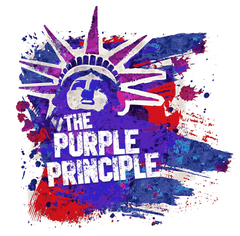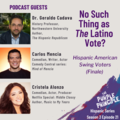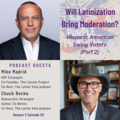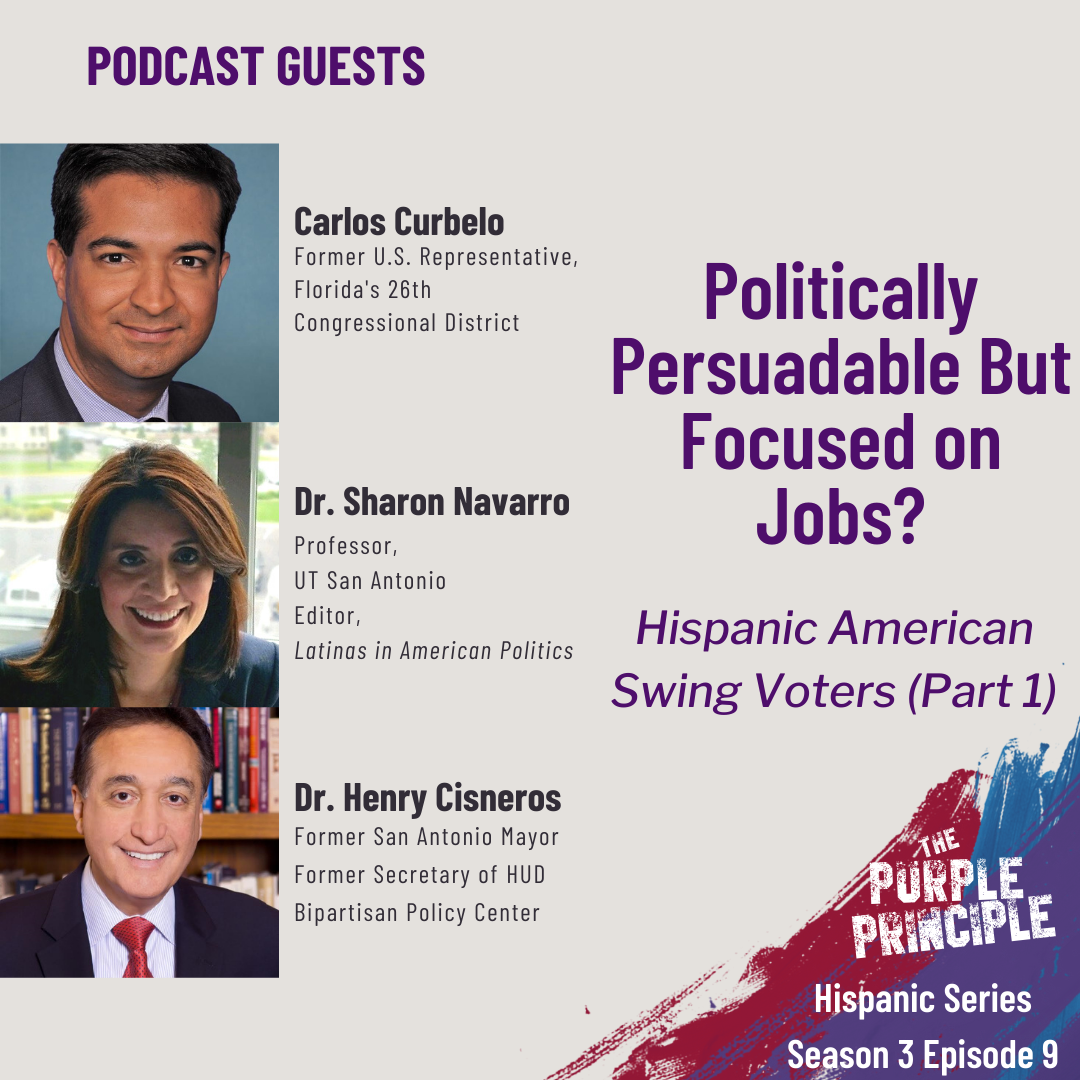Playlist: Hispanic American Swing Voters
Compiled By: Fluent Knowledge

In the lead-up to the 2022 midterm elections, during National Hispanic Heritage Month, The Purple Principle is exploring the overlaps between independent voters and Hispanic American political identity. Over 3 episodes, host Robert Pease speaks with a diverse range of guests, including political strategists, elected officials, academics, and even comedians, who offer engaging insights on a question that has long frustrated partisan politics: who is the Latino voter?
Episodes available FREE on PRX Exchange.
Homepage: https://fluentknowledge.com/hispanic-series
No Such Thing as The Latino Vote? Hispanic American Swing Voters (Part 3 of 3)
From Fluent Knowledge | Part of the The Purple Principle Podcast series | 30:32
Historian Geraldo Cadava and comedians Carlos Mencia and Cristela Alonzo discuss the many different perspectives that shape Latino politics.
The Purple Principle wraps up its series on the Hispanic American swing voter with three very different yet similarly insightful guests. Kicking things off, Northwestern University historian and frequent columnist Geraldo Cadava tells us that both parties have spun overly simplistic narratives of the Hispanic voter – which is a mythical concept, in his view. Instead, according to Cadava, it’s time to dispense with the myth of the Hispanic vote nationwide, and to look beyond the various Hispanic communities toward individual beliefs and motivations. We move on to speak with two individuals with particularly resonant beliefs, motivations, and observations. The veteran comedian Carlos Mencia has always been an iconoclast who aims satire in all directions, political and social. Mencia reflects on his immigrant childhood, as one of 18 children, and living with relatives in a rough East L.A. neighborhood. He explains his indie-minded philosophy, noting that to be completely conservative or liberal is to ignore the critical importance of both change and tradition in American society and culture. Writer, producer, and comedian Cristela Alonzo knows a thing or two about that awkward tension between tradition and change. She grew up in an immigrant Tejano Catholic family just over the U.S. border in an abandoned diner and became the first Latina to create and star in a network television comedy, Cristela. Pointing out the large number of Mexicans who shop regularly in U.S. border malls but then return home, she reminds us that immigration for so many recent American arrivals is an imperative, not an option. We’ve learned so much from all our Hispanic Series guests. In our first episode: Former Miami area moderate GOP Congressman Carlos Curbelo on major party approaches to Hispanic voters Former centrist Democratic Mayor of San Antonio, Henry Cisneros, on the economic sway of the Republican Party in Texas, where the GOP has controlled state offices for 20 years UT San Antonio Political Scientist Sharon Navarro on the “persuadability” of many Hispanic voters, particularly immigrants whose political opinions are still taking shape In Episode Two we were fortunate to sit down with Chuck Rocha (Democratic strategist) and Mike Madrid (moderate GOP strategist). They’ve joined forces to push back on the anti-democracy elements of today's GOP and to co-host the timely and topical podcast, The Latino Vote. We hope you’ll sample all three episodes and contemplate the Latinization of U.S. politics and society, and whether some much-needed moderation may result. As always, please reach out with comments, suggestions, feedback or reviews.
The Purple Principle is a Fluent Knowledge production. Original music by Ryan Adair Rooney.
Will Latinization Bring Moderation? Hispanic American Swing Voters (Part 2 of 3)
From Fluent Knowledge | Part of the The Purple Principle Podcast series | 29:16
Part 2 of our series on understanding Hispanic voters

How large a role will Hispanic voters play in the 2022 elections and beyond in U.S. politics? (Hint: Huge.)
How are the major parties appealing to this voting bloc characterized by great diversity politically, economically and via country of origin, language, age, etc? (Not so effectively.)
And can Latino candidates in both parties help turn the temperature down on our political rhetoric and the affective polarization that dominates elections and civic life? (No sign of that yet.)
In the second episode of our Hispanic American Swing Voters series, these questions are central to our discussion with veteran political strategists Chuck Rocha, on the Democratic side, and Mike Madrid, on the traditionally conservative, non-Trumpian GOP side. They’ve teamed up to co-host the insightful podcast, The Latino Vote.
“What's nice about this podcast is we're both at an age where we don't, we don't care about the parties anymore,” confides Madrid. “We care about our communities first and foremost.”
“I knew Mike because he'd been working in California politics and he’s Latino,” says Rocha. “I never dreamed we would ever do any work together. But I think Donald Trump brought us together to fight a common enemy.”
Despite anti-immigrant and anti-democracy rhetoric and action, today’s GOP has been picking up Latino candidates and voters in races throughout the country. We discuss that development, and why those races might put forth less extreme rhetoric if more Latino campaign managers familiar with these communities were involved.
Find out more about the growing Latinization of our elections and body politic with Chuck Rocha and Mike Madrid of The Latino Vote podcast and latinos.vote news aggregation site.
Original music by Ryan Adair Rooney.
Politically Persuadable But Focused on Jobs? Hispanic American Swing Voters (Part 1)
From Fluent Knowledge | Part of the The Purple Principle Podcast series | 30:51
Is a large and growing segment of Hispanic American voters now leaning independent? That’s the operative question in this first episode on Hispanic swing voters, featuring three noted experts: former Florida Congressman Carlos Curbelo, UT San Antonio political scientist Dr. Sharon Navarro, and former four-term San Antonio Mayor and Clinton Cabinet member, Dr. Henry Cisneros. We tackle the recent shift of some Latinos to the GOP, why many Hispanic voters may be registered to a political party yet remain “persuadable,” and what this important group of voters prioritizes when deciding how to vote.
Is a large and growing segment of Hispanic American voters leaning independent, as in less securely tied to either of the two major parties? That’s the operative question in this first episode on Hispanic swing voters, featuring three noted experts: former Florida Congressman Carlos Curbelo, UT San Antonio political scientist Dr. Sharon Navarro, and former four-term San Antonio Mayor and Clinton Cabinet member, Dr. Henry Cisneros. Curbelo notes the growing diversity of Hispanic voters, even within the south Florida district he represented. He goes on to explain that the recent and, to many, surprising shift of Latinos toward the Republican Party may be a result of discomfort with far left rhetoric among families who have emigrated from socialist dictatorships such as Venezuela, Nicaragua and Cuba. Dr. Sharon Navarro observes many Hispanic voters may be registered to a political party yet remain “persuadable” by candidates speaking to concerns from the opposing side. She notes, for example, that the federal government’s Customs and Border Protection (CBP) is a major employer in the South Texas region. As a result, calls from the far left to completely shut down the border patrol may have persuaded some Texas Hispanics to vote GOP despite the extreme white nationalist rhetoric on the far right. “Politics is a marketplace of ideas,” notes Dr. Henry Cisneros, one of the nation’s first Hispanic mayors who governed as a pragmatic centrist. “Progressives, people to the left, Democrats generally would do well to try to put yourself in other people's shoes who are striving to create a better life for their families, who want the best possible education for their children in basic ways and in traditional ways, with respect to views about the country and patriotism.” Our nation’s fastest growing ethnic group may be our least predictable voting bloc again in the 2022 elections and beyond. Tune in for a better understanding of the diverse backgrounds, priorities and viewpoints characterizing Hispanic American swing voters.